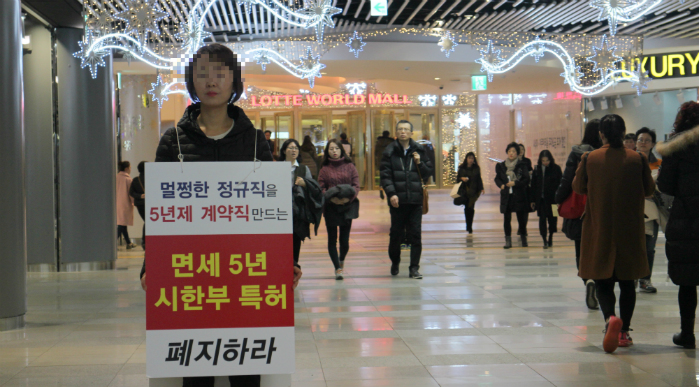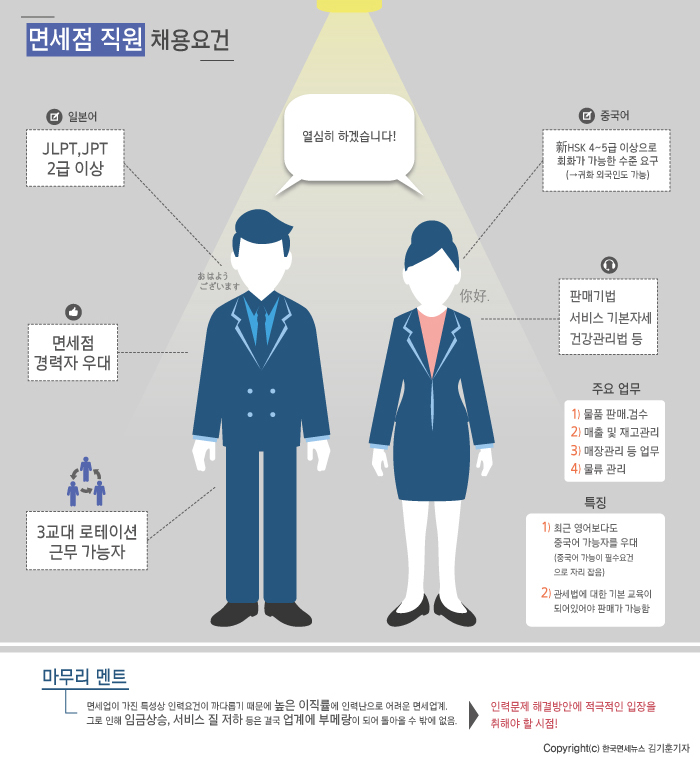The ironical duty-free market created this manpower shortage…The ‘Winner’s Curse’
The domestic duty-free market is suffering from ‘manpower shortage’ on one hand, and concerned about ‘employment instability’ due to the termination of licenses on the other hand. The industry ushered in the New Year in a state of conflicting disarray. As the Lotte Duty Free World Tower Store and the Walkerhill Duty Free Shop (SK Networks) failed to get the license for downtown duty-free shops last November, the jobs of about 2,200 employees are ‘hanging by a thread.’
 Photograph=Kim Sun-ho/ A downtown duty-free shop deprived of its license. The employees are preparing to open the store everyday in a distracted atmosphere,.
Photograph=Kim Sun-ho/ A downtown duty-free shop deprived of its license. The employees are preparing to open the store everyday in a distracted atmosphere,.
Shinsegae DF is trying to recruit over 300 people to make up for the manpower shortage. It aims to open a duty-free shop in the main store of Shinsegae Department Store around May. “We are talking with the Walkerhill Duty Free Shop about employment succession,” said a Shinsegae insider. “Currently we need to hire more than 300 people, and we are making diverse efforts to make a soft landing in the duty-free industry by not only recruiting existing duty-free shop workers, but also hiring additional full-time workers.” Also, Doosan said, “We are trying hard to hire people working in duty-free shops including the Walkerhill Duty Free Shop, and we are proposing better conditions than those of its own employees with the same length of service and position to people who have experience of working in duty-free shops.”
The duty-free industry has been distressed in terms of brand and recruiting since the battle for licensing was over. In particular, with professional duty-free workers in short supply compared to the number of duty-free shops, the conflicting manpower structure of the duty-free market created a situation in which winning the license did not allow the winners ‘to laugh a hearty laugh.’ As many as 5 duty free-shops are scheduled to be opened in downtown Seoul. It seems that the internal warfare fought to cover the manpower shortage will never end. The SM Duty Free Shop will open in January, and the Shilla IPark Duty Free Shop around March, and the Shinsegae Duty Free Shop and the Doota Duty Free Shop around April and May, and the Galleria Duty Free Shop 63 around June. In other words, the duty-free market is gradually increasing in volume, but the professional manpower that can support the industry is limited, sparking a red alert.
 Photograph=Kim Sun-ho/ A duty-free shop worker engaged in single-person demonstration in front of the Lotte Duty Free World Tower Store
Photograph=Kim Sun-ho/ A duty-free shop worker engaged in single-person demonstration in front of the Lotte Duty Free World Tower Store
However, duty-free shop employees are suffering from untimely ‘employment instability,’ creating an ironical situation. Due to the 5-year downtown duty-free shop license, they will become ‘time-limited contract workers’ as a matter of fact. The Lotte Duty Free World Tower Store is a good example. A duty-free shop, directly hit by the new licensing system, staged a one-man demonstration holding a picket that said “to abolish the 5-year licensing system that turns full-time employees into 5-year contract workers.” A Lotte Duty Free Shop insider said, “We are trying our best to ‘stabilize employment,’ e.g. hiring more people by expanding the main store of the Lotte Duty Free Shop (Sogong-dong).”
But the reality is that even though employment succession is completed for most people including general workers and low-level managers, it seems difficult to guarantee jobs for high-level managers. Recently a rumor is circulating in the industry, i.e. high-level executives of Lotte and Shilla transferred to other duty-free shops. It is no exaggeration to say that it reflects the ironical duty-free manpower structure. Accordingly, until the government comes up with more concrete and substantial countermeasures, it seems that the ‘employment instability’ felt by duty-free shop workers cannot but continue.

Professional manpower is essential to duty-free shop operations. Various areas of the duty-free industry, e.g. the MD area for attracting various brands, sale and inspection of items, logistics management, and sales and inventory management, require professional manpower for normal duty-free shop operations. As duty-free shop sales clerks sell bonded goods, they must be familiar with the Customs Act and regulations and procedures related to airports and ports. Also, as they have to deal with diverse foreign tourists, they must have considerable knowledge of handling information on local residents and foreigners, and they must be able to communicate with them efficiently.
According to the report of ‘Expected benefits of additional downtown duty-free shops’ published by Korea Customs Service in 2015, about 0.15 persons (based on 10 duty-free shops in 2013) are employed per 1㎡ of floor space. In other words, 0.5 persons are working in 1 pyeong (3.3m2). It means that if the SM Duty Free Shop, the Shinsegae Duty Free Shop and the Doota Duty Free Shop open this year, the manpower shortage is highly likely to worsen. The competition to ‘supplement the manpower shortage’ in each duty-free shop resulted in the annual salary ‘auction,’ and may have a negative effect on the duty-free market.
As a result, an increasing number of people are demanding that there should be an exit plan for a dire shortage of professional workers to cope with the increasing number of duty-free shops. In particular, they argue that more efforts should be made to train professional manpower consistently in consideration of the characteristics of the duty-free industry. Instead of the ‘recruiting’ war caused by the limited manpower pool, the industry needs to maximize the synergies in the duty-free market by ‘cultivating professionals.’
“Employment instability was caused by the 5-year time-limited duty-free shop licensing system,” said a duty-free industry insider. “In consideration of the voices in the field, the government must urgently come up with a countermeasure and an alternative. We cannot allow people with duty-free shop experience and know-how to change jobs every 5 years,” holding the government and the system responsible for the state of affairs. The duty-free industry manpower market requires the government to do something. Also, the industry must put an end to the annual salary ‘auction’ due to the manpower shortage, and establish an efficient manpower supply system by training professional duty-free workers.
In 2016 it is forecast that the duty-free manpower market will enter the ‘maelstrom’ of chaos in earnest, and an invisible ‘war’ will be fought. As it is difficult to train professional workers right away, existing duty-free shops will try to ‘keep their employees,’ and new and expanded duty-free shops will try to ‘take them away.’ The whole hullabaloo is casting a dark shadow of annual salary ‘auction’ over the duty-free industry.


